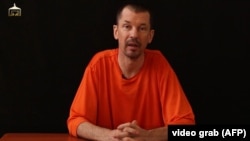As a U.S.-led coalition coordinates strategy against the Islamic State militants in Iraq and Syria, the group’s tech-savvy public relations machine grabs headlines with shocking videos and other propaganda. But some regional analysts say while the Islamic State warns the coalition to stay away, its real goal is to draw the West into battle.
In a video released Thursday, British journalist John Cantlie speaks like a newscaster, saying he is a prisoner of the Islamic State group, also known as ISIS and ISIL.
Cantlie was kidnapped in Syria two years ago while traveling with James Foley, an American reporter. The militants have beheaded Foley, another American journalist and a British aid worker. In the video, which looks professionally shot, Cantlie wears orange like the other men wore when they were beheaded.
“Maybe I will live, and maybe I will die but I want to take this opportunity to convey some facts that you can verify," he said. "Facts that, if you contemplate, might help preserving lives.”
Cantlie warns Western governments against invading Iraq, after their failure to secure Iraq and Afghanistan despite long wars.
Another militant video released this week looks like a Hollywood movie preview - with blasts and threats of attacks. The final explosion is followed by a title card that says “Flames of War: Fighting has Just Begun” followed by “coming soon.”
But some regional analysts say that while the Islamic State warns the West against attacking, what it really wants is for the West to fight.
Daniel Wagner, head of the security firm Country Risk Solutions, says "their ultimate objective is to ensure that the U.S. and the West will engage them on the battlefield."
"That’s what they ultimately want," he said. "It will also help them in their recruiting process and the U.S. and the West are doing exactly what it appears that ISIS wants them to do.”
He says Western involvement will likely draw even more foreigners to join the Islamic State’s battle against what it calls “crusaders,” which basically means anyone who doesn’t support its extremist version of Islamic law.
But Wagner adds, in the end, the Islamic State might not get the fight it wants.
“I do find myself wondering whether this is the type of engagement they’ll want however," he said. "As long as it's being done by the air with drones and planes, I don’t know how ISIS can say that it’s actively engaging the U.S. on the battlefield.”
As people flee Islamic State territories, some say that destroying the group is the only way to save the region and prevent terrorism from spreading.
Over lunch in Lebanon, 25-year-old Firas describes what is happening in his hometown in Syria. The Islamic State has taken over most of the province, but other rebel groups still fight in the city.
He says the state no longer functions because government workers all fled.
Recently, at a checkpoint, soldiers asked three of his friends which group they support, he says. The friends asked the soldiers who they were with. The soldiers said they were from the Free Syrian Army rebel group.
The young men, who backed no groups, lied and said they liked the Free Syrian Army the best. But Firas says the soldiers were actually from the Islamic State. The men were killed on the spot.





